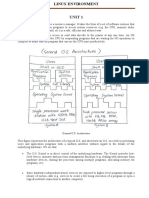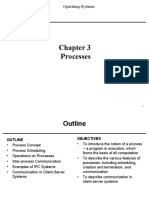Linux Kernel
PROCESS
1
�Linux Kernel : Process
Process : a running program.
Individual processes exist independently alongside each other and cannot affect each other directly. Each processs own area of memory is protected against modification by other processes.
Thread : a group of processes.
Each thread runs within the same address space as the father process.
�Processes and Threads
Linux uses the same internal representation for processes and threads; a thread is simply a new process that happens to share the same address space as its parent. A distinction is only made when a new thread is created by the clone system call. fork creates a new process with its own entirely new process context clone creates a new process with its own identity, but that is allowed to share the data structures of its parent Using clone gives an application fine-grained control over exactly what is shared between two threads.
�Linux Kernel : Process
Process states
Ready : the process is competing for the processor
or could be executed, but another process is currently being executed.
Execution : the process is active or running or
being executed by processor.
Suspend : the process is waiting for an external
event.
�Linux Kernel : Process
Process states (cont)
Stopped : the process has been suspended by an
external process.
Zombie : the process has finished executed, but it
is still references in the system.
�Linux Kernel : Process
Signal
Stopped
Signal
Creation
Ready
Scheduling
Termination Executing Zombie
End of input/output
Input/output
Suspend
State diagram of a process.
6
�Linux Kernel : Process
Task structure
The description of the characteristics of a process is given in the structure task_struct, which is defined in include/linux/sched.h within Linux source code (/usr/src/linux ) .
struct task_struct { ... ... };
�Linux Kernel : Process
Task structure (cont)
Process status
volatile long state;
The state variable contains a code for the current state of the process. List of state constants :
TASK_RUNNING TASK_INTERRUPTIBLE TASK_UNINTERRUPTIBLE TASK_STOPED TASK_ZOMBIE TASK_SWAPING
�Linux Kernel : Process
Task structure (cont)
long counter; long priority;
The counter variable holds the time in tick for which the process still run before mandatory scheduling action is carried out. The priority holds static priority of a process
�Linux Kernel : Process
Task structure (cont)
unsigned long flags; int errno; int debugreg[8];
The flags contains the combination of system status flags PF_ALIGNWARN, PF_PTRACED, PF_TRACESYS, PF_STARTING and PF_EXITING.
struct exec_domain *exec_domain;
A description of which Linux is to be emulated for each process.
10
�Linux Kernel : Process
Task structure (cont)
Process identification
pid_t pid, pgrp, session; int leader;
Every process has its own process ID, and is assigned to a process group and session. Every session has a leader process.
11
�Linux Kernel : Process
Task structure (cont)
Process relationship
struct task_struct *next_task; struct task_struct *prev_task;
All processes are entered in a doubly linked list which the start and end of this list are held in the global variable init_task.
init_task init_task
Process 1 Process 1
Process 2 Process 2
Process N Process N
12
�Linux Kernel : Process
Task structure (cont)
Process relationship (cont)
struct struct struct struct struct task_struct task_struct task_struct task_struct task_struct *p_opptr; /* original parent */ *p_pptr; /* parent */ *p_cptr; /* youngest child */ *p_ysptr; /* younger sibling */ *p_osptr; /* older sibling */
All processes have the family relationships which has created it using the system call fork().
13
�Linux Kernel : Process
Task structure (cont)
Process relationship (cont)
p_cptr p_pptr parent parent p_pptr p_osptr child child p_ysptr p_ysptr oldest child oldest child
p_pptr
p_osptr youngest child youngest child
The family relationships of processes.
14
�Linux Kernel : Process
Task structure (cont)
Memory management
Each process holds their own memory substructure.
struct mm_struct *mm;
The component of memory structure:
struct mm_struct{ unsigned long start_code, end_code, start_data, end_data; unsigned long start_brk, brk; unsigned long start_stack, start_mmap; unsigned long arg_start, arg_end, env_start, env_end; };
15
�Linux Kernel : Process
Task structure (cont)
Process credentials
To handle access control, every process has a user ID, group ID and others.
uid_t uid, euid, suid, fsuid; gid_t gid, egid, sgid, fsgid; gid_t groups[NGROUPS];
These are inherited by the child process from the parent process. The fsuid and fsgid are used for actual access control to the file system.
16
�Linux Kernel : Process
Task structure (cont)
File information
The file system structure is pointed from fs variable.
struct fs_struct *fs;
The files variable is pointed to opened file of a process.
struct files_struct *files;
17
�Linux Kernel : Process
Task structure (cont)
Signal handlers
struct signal_struct *sig; unsigned long signal, blocked; struct signal_queue *sigqueue, **sigqueue_tail;
The sig is a signal handler. The signal variable contains a bit mask for signals received for the process. The blocked contains a bit mask for all the signals the process intends to handle later.
18
�Linux Kernel : Process
Task structure (cont)
Timing
unsigned long start_time; unsigned long it_real_value, it_prof_value, it_virt_value; unsigned long it_real_incr, it_prof_incr, it_virt_incr;
The start_time contains the time at which the current process was generated. The it_real_value, it_prof_value, it_virt_value, it_real_incr, it_prof_incr and it_virt_incr are used in the interval timer (interrupt).
19
�Process Scheduling
Linux uses two process-scheduling algorithms: A time-sharing algorithm for fair preemptive scheduling between multiple processes A real-time algorithm for tasks where absolute priorities are more important than fairness A processs scheduling class defines which algorithm to apply. For time-sharing processes, Linux uses a prioritized, credit based algorithm. The crediting rule
credits := credits + priority 2
factors in both the processs history and its priority. This crediting system automatically prioritizes interactive or I/O-bound processes.
20
�Process Scheduling (Cont.)
Linux implements the FIFO and round-robin real-time scheduling classes; in both cases, each process has a priority in addition to its scheduling class. The scheduler runs the process with the highest priority; for equal-priority processes, it runs the process waiting the longest FIFO processes continue to run until they either exit or block A round-robin process will be preempted after a while and moved to the end of the scheduling queue, so that roundrobing processes of equal priority automatically time-share between themselves. Only the root user can change the class of the current task via the sched_setscheduler syscall.
21
�Linux Kernel : Scheduler
Scheduling classes
There are three classes of processes. (all are defined in include/linux/sched.h)
#define SCHED_OTHER #define SCHED_FIFO #define SCHED_RR 0 1 2
: task are normal user tasks (default) SCHE_FIFO : task that running with this policy will never be preempted. It is a real-time policy. SCHE_RR : this is an another real-time policy, but the task will leave the CPU if there is another realtime task in the run queue.
SCHE_OTHER
22
�Linux Kernel : Scheduler
Scheduling classes (cont) First In First Out (SCHED_FIFO)
Another process of the type FIFO having a higher priority become ready, and is then executed. The process becomes suspended whilst waiting for an event, such as an input or output. The process voluntarily gives up the processor.
23
�Linux Kernel : Process
Creation
Ready
Termination Executing Zombie
End of input/output
Input/output
Suspend
Process status of SCHED_FIFO
24
�Linux Kernel : Scheduler
Scheduling classes (cont) Round robin (SCHED_RR)
All process have the same FIFO priority. The process becomes suspended whilst waiting for an event, such as an input or output. The process will leave the CPU if it takes a running time out, call quantum time. The last running process is moved to the end of running queue.
25
�Linux Kernel : Process
Creation
Ready
Scheduling
Termination Executing Zombie
End of input/output
Input/output
Suspend
Process status of SCHED_RR
26
�Linux Kernel : Scheduler
Scheduling classes (cont) Other (SCHED_OTHER)
The SCHED_OTHER is a default scheduling policy. The process will be executed if no any process that is SCHED_FIFO or SCHED_RR in the running queue. The process priority is used to make a decision for select the next process.
27
�Linux Kernel : Process
Reference
Linux Internal. Moche Bar. McGraw-Hill Companies, Inc. 2000 Linux Kernel Internals. Michael Beck, Harald Bohme, Mirko Dziadzka, Ulrich Kunitz, Robert Magnus and Dirk Verworner. Addison-Wesley Longman Ltd. 1996 Understanding the LINUX KERNEL.Daniel P. Bovet & Marco Cesati. OReilly & Associates Inc. 2001.
28

























































































